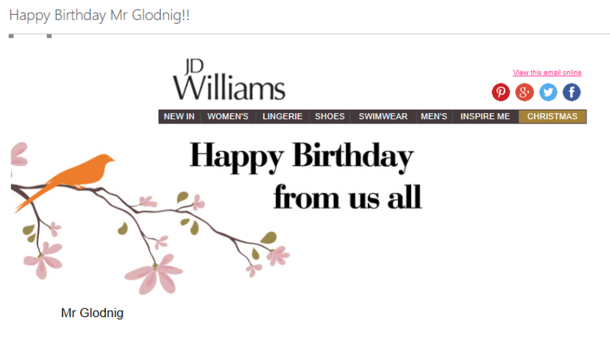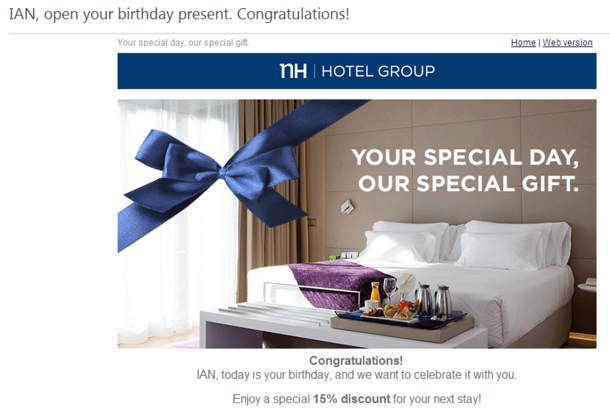
In life there are a number of certainties. The annual celebration of our birth is one of them. For me, the 6th December each and every year marks my birthday. When it comes to the world of Customer Experience, there are also a number of certainties that can be counted on. John Lewis being recognised as one of the UKs most trusted brands is one. Ryanair sounding their bugle when arriving at a destination on time is another. Virgin trains WiFi failing to work is also an annoying certainty!
A few years ago (I think it was 2010), I purchased a pair of Converse trainers from online retailer JD Williams. The purchase (actually conducted as a mystery shopping exercise whilst in my role as Head of Group Customer Experience at Shop Direct) has led to me experiencing another certainty in my life – my annual ‘Happy Birthday’ email from JD Williams.
We are all used to receiving random emails from organisations we interact with for both business and as consumers. Sometimes the emails are welcomed – if they hit our ‘in boxes’ at the right time, they may just catch our eye and lead to us investigating the subject in more detail. Enticing discounts in the subject line can prove too good to ignore. Often emails are unwelcome – a little like inbox ‘vomit’ which we are very happy to consign to the trash as quickly as possible!
Marketing emails have actually become as big a certainty as anything else in the continuously connected world we now live in – and that brings me nicely back to the subject of this blog post. Some businesses are very good at linking key events in a customer’s life to their strategic marketing campaigns. As consumers demand more and more personalisation in the experiences they have, this seems like a perfectly sensible strategy. The most significant event that a company can connect with is the certainty that is a birthday.
Every 6th December, I receive an increase in email traffic. Some of the emails are from my wonderful friends and family wishing me ‘many happy returns’. However many of the emails are from companies eager to show me how important I am as a customer. One example is the email I received from NH Hotels this year – it has been a while since I stayed in one, but in my opinion, their email was good and welcome. It was clear, simple and to the point:

I do not have a problem with companies I have interacted with contacting me on a special occasion to make me feel as though I should interact with them again. It is all part of developing ongoing relationships with customers. The key is to get the timing, tone and content of the email right.
NH Hotels demonstrated how to get it RIGHT and create a good impression with the customer. Sadly, JD Williams did not. You will have noticed that the title of this blog post is ‘Happy Birthday Mr Glodnig’. I have been called many things in my 42 years. It is only JD Williams who decided that my real name is not suitable. When I placed my one and only order with JD Williams – online – they decided to change my name (fortunately not by deed poll!).
I know that I entered my details correctly as I personally entered them. I also entered my credit card details using my real name (obviously) – my payment would not have gone through otherwise. This was clearly not noticed by JD Williams computer systems. Ever since I placed my one and only order with them, JD Williams have been communicating with Mr Glodnig. Every 6th December, Mr Glodnig receives a special birthday email from JD Williams. Interestingly, JD Williams offer Mr Glodnig the same ‘gift’ that NH Hotels offered Mr Golding (that’s me!).
JD Williams are not the only company to get a customers name wrong. A name like Golding is easy to ‘mis-hear’ over the phone – in the past I have received correspondence for Mr Goulding and Mr Goldring. However since the ‘digital revolution’, it has become very rare for my name to be misspelt – almost certainly because it is me, the consumer, entering my name for myself online. What is certain though is that I do NOT appreciate receiving communication from a company that cannot even spell my name correctly – especially on my birthday!!!
If a business wants to create the right impression with a customer they must be able to get the BASICS right. I consider the correct spelling of a customers name to be a pretty fundamental basic. If a business wants to create the right impression, it can also consider trying to EXCEED customer expectations. Sending a ‘special’ email on a customers birthday with a ‘gift’ can be considered a good example of this. HOWEVER, if you try to ‘sprinkle fairy dust’ on something that is very badly broken, the effect could be fatal.
I do not know who Mr Glodnig is. Hence, every time I receive an email for him in my inbox it will be instantly DELETED. I would prefer JD Williams not to ‘vomit’ things addressed to him into my inbox – especially on my birthday. If JD Williams want to communicate with Mr Golding, I MAY consider having a look at what they have on offer. Until that time, I do NOT consider myself as a customer who has a relationship with them – and that is the point. Create the WRONG impression and you may end up with no customers at all.
What funny names have you been called in communications from companies? If you are happy to share, I am sure readers will be very happy to read and enjoy!



